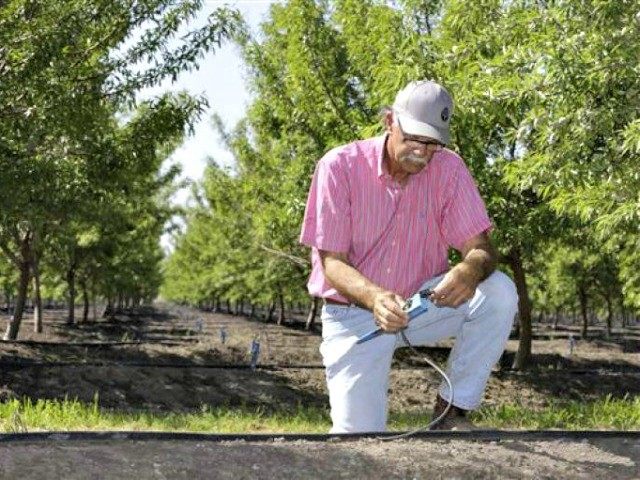Despite Mother Jones magazine calling on Governor Jerry Brown to “never let a good crisis go to waste” and use climate change fears to expand the Nanny State’s reach to controlling what crops California farmers are allowed to grow, Brown courageously blasted the idea this week as “Big Brother.”
Brown surprised reporters after a drought-related meeting at the Capitol commenting, “That’s a ‘Big Brother’ move, and we’re not in that position”.
The Left’s new initiative to regulate what we eat by controlling what we can grow follows an important article published in Mother Jones, the Bible of the Left, earlier this week titled, ‘Here’s the Real Problem With Almonds’ by Tom Philpott, cofounder of Maverick Farms, a center for sustainable food education in North Carolina.
Philpott complains that “California’s drought-stricken Central Valley churns out 80 percent of the globe’s almonds, and since each nut takes a gallon of water to produce, they account for close to 10 percent of the state’s annual agricultural water use—or more than what the entire population of Los Angeles and San Francisco use in a year.”
His sustainable “Nanny State” friends disparagingly refer to California’s $11 billion almond business as trading in “The Devil’s Nut.” The Left wants to regulate nut farming as a water-heavy activity.
“Annual crops like cotton, alfalfa, and veggies are flexible—farmers can fallow them in dry years. That’s not so for nuts, which need to be watered every year, drought or no, or the trees die, wiping out farmers’ investments,” according to Philpott.
The Left’s arguments against almonds include, 1) “most of our almonds end up overseas”; 2) “almond fields are expanding—in a big way”; 3) almond trees “always require a lot of water—even during drought”; 4) “farmers oppose water regulation and blame environmentalists for not building water storage infrastructure; and 5) “it’s not small-scale farmers that are getting rich off the almond boom.”
What excites the Left about the California drought is the opportunity to use the crisis to take regulatory control of the nine million acres that farmers plant each year, the 80 percent of the state’s water used in agriculture, the four percent of the state’s workforce, and the $50 billion in revenue from food sales.
Farmers have become one of the chief political nemeses to the Left’s Nanny State ambitions. Rural communities have continually been supported by California voters who are very empathetic to the state’s industry and the plight of agricultural communities.
Despite all the fear-mongering that the four-year-old drought will cause a global warming economic catastrophe, California’s Legislative Analysts’ Office just came out with positive economic projections. “Even a substantial decline in agriculture’s share of the economy, such as … during and after the 1976-77 drought, probably would have only a limited impact on the overall state economy,” the report said.
The Pacific Policy Institute of California’s latest report also highlights that “California’s climate is highly variable, with frequent droughts and floods.” Despite the current drought, PPIC believes:“Farmers will continue shifting to higher revenue crops and will rely increasingly on water markets to irrigate these crops. They will also need to manage groundwater so it is available during dry periods. Some land will probably have to come out of production—particularly if average precipitation falls. Even with these changes, farm revenues can continue to rise.
The rising economic success of California farming explains why Democrat Governor Jerry Brown states, “Agriculture is an important pillar of California.” His courageous stand that “We have to be very slow to be starting to pick” between crops, with policies favoring one over another, is a rejection of the extreme left of his own party that would use pain from the drought as a crisis opportunity to gain more power and control for themselves.

COMMENTS
Please let us know if you're having issues with commenting.